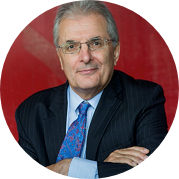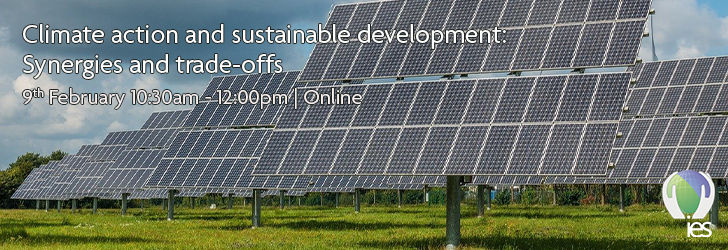How can we ensure that ambitious climate action fits within the wider vision of sustainability?
Join us for the first discussion meeting in our STAGES on the road to COP26. This discussion will be focused on the theme of sustainability and will explore the synergies and trade-offs between sustainable development and climate action.
Hear from our keynote speaker Professor Chris Rapley CBE:
Finding our balance
The 2030 Sustainable Development Goals (SDG) and the Nationally Determined Contributions (NDC) of the 2015 Paris Climate Change agreement commit the nations of the world to create a better future for humankind and the natural world. However, with the 17 SDGs comprising 169 targets and the 164 NDCs covering more than 7000 actions, the integration into national policies, strategies and planning, in a coherent and synergistic manner, is a monumental challenge. Analysis by the International Council for Science (ICSU) and a tool created by the Stockholm Environment Institute (SEI) provide insights into the myriad interconnections between the SDG targets and NDC actions, and reveal synergies and conflict/trade-offs, some of the latter occurring even within the SDGs. The situation is exacerbated by policy formulation for the SDG and NDC commonly being ’siloed’ into different government departments, which themselves are separated from the departments charged with policy implementation. Whilst the ICSU analysis and SEI tool can assist policy makers, there may be a role for some core principles to guide their work.
Take part in the conversation, debate with fellow environmental professionals and help shape a sustainable vision for climate action leading up to COP26.
Our speaker

Professor Chris Rapley CBE is Professor of Climate Science at University College London (UCL). He is a Fellow of UCL and of St Edmund's College Cambridge, a member of the Academia Europaea, Chair of the European Science Foundation’s European Space Sciences Committee, Member of the Advisory Board of the UK government’s Clean Growth Fund, Patron of the Surrey Climate Commission, a member of the UK Science Museum Group’s Science Advisory Board, a member of the Science Advisory Board of Scientists’ Warning, and a member of the UK Parliamentary and Scientific Committee.
His previous posts include Director of the Science Museum, Director of the British Antarctic Survey, Chairman of the London Climate Change Partnership, President of the Scientific Committee on Antarctic Research, Executive Director of the International Geosphere-Biosphere Programme, and Distinguished Visiting Scientist at NASA’s Jet Propulsion Laboratory. He was founder and Head of UCL MSSL’s Earth Remote Sensing Group, Chair of the International Planning Group for the International Polar Year 2007-2008 and Chair of the European Space Agency Director General’s High-Level Science Policy Advisory Committee.
More recently he has focused on the role of climate scientists in delivering value to society through decision making, public policy and more effective communication. He is Chair of the UCL Policy Commission on Communicating Climate Science.
In 2014 Prof Rapley and the playwright Duncan Macmillan wrote the acclaimed play ‘2071’ which Prof Rapley performed at the Royal Court theatre and in Hamburg and Brussels. More recently Prof Rapley was the Science Consultant on BBC1’s ‘Climate Change – The Facts’ presented by Sir David Attenborough.
In 2003 Prof Rapley was appointed CBE by Her Majesty the Queen. In 2008 he was awarded the Edinburgh Science Medal for having made 'a significant contribution to the understanding and wellbeing of humanity'.
This meeting is open to both IES members and non-members. This meeting is now at capacity.
This event is part of our commitment to work with our members, other professional bodies and environmental scientists from across the sector to shape the discussion over the next year, and set out our roadmap to COP26. Moving into the new year, we will be focusing our activities in the run-up to COP26 around six key themes, outlining our STAGES on the road to COP26.
How can I get involved?
We have established a new COP26 Community for members involved in COP and the themes outlined above, which will help to shape our activities in this area over the coming year. This community will be focused on championing the work of experts and evidence around climate change, and driving change to ensure adaptation measures are accurate, ambitious and achievable, through tailored discussions, events and resources. Please get in touch to get involved.
If you aren’t an IES member, or you represent another organisation or professional body that could collaborate with us over the next year, please do get in touch and join the conversation.

